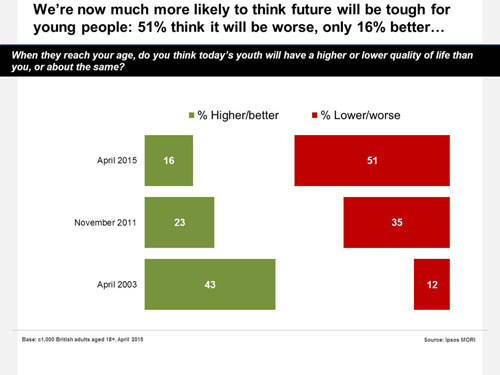Over half of public think that the future will be worse for young people
A new Ipsos survey shows widespread and growing pessimism for the future of young people in Britain.
51% say they expect that young people will have a lower quality of life than they themselves have had, and only 16% of people think it will be better.

This is a big drop in optimism for today’s youth over the last few years. In 2003, 43% thought that young people would have a higher quality of life than them and just 12% thought it would be worse. Even by 2011, three years into the economic crisis, 23% thought young people would have a better future, and 35% thought it would be worse.
This pessimism is very consistent across age groups: just 17% of 18-34 year olds think the future for young people will be better, 15% of 35-54 year olds think the same, as do 17% of those aged 55+. There is also little difference between social classes, men/women, or across regions.
However, there is a large difference in views between Conservative and UKIP voters: UKIP voters are particularly pessimistic with 73% thinking the future will be worse compared with 41% of Conservative voters. Labour (56% saying worse) and Lib Dem (61% saying worse) voters are both somewhere in between.
Bobby Duffy, MD of Ipsos Social Research Institute said:
'One of Ed Miliband’s 6 pledges is for Britain to be “a country where the next generation can do better than the last”. Our new survey shows an increasing belief that this will not happen – and that this is a consistent worry across age groups, regions, social classes and men and women. But it does separate supporters of different political parties. In particular, UKIP supporters’ are very pessimistic about the future, while Conservatives are much less so. This isn’t just about short-term economic cycles – we know from our international studies that an automatically better future for young people in developed countries is much less clear-cut as the balance of power shifts to emerging markets. We also know that the combination of short-term political cycles and young people’s lack of electoral weight through lower voting levels means other issues are prioritised. But as the survey makes clear, concern for young peoples’ future is a growing trend, across generations – there is therefore still a significant electoral prize for any party that can present a credible vision of a better future for young people.'
Technical note:
Ipsos interviewed a representative sample of 1,010 adults aged 18+ across Great Britain. Interviews were conducted by telephone 26-29 April 2015. Data are weighted to match the profile of the population.


